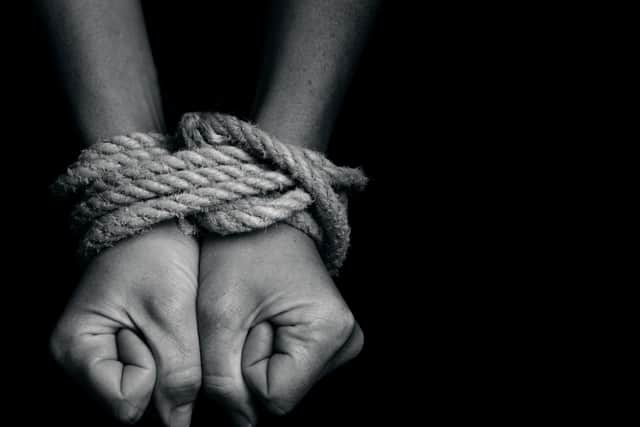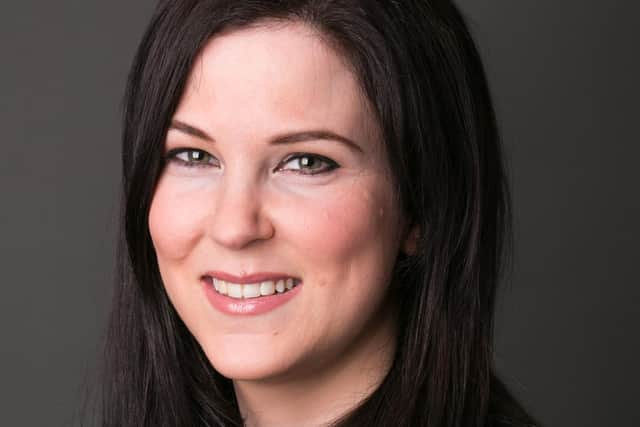Exclusive: No one in Northamptonshire convicted under 2015 Modern Slavery Act as charity calls for change
and live on Freeview channel 276
No one in Northamptonshire has been convicted of an offence under the Modern Slavery Act since was passed in 2015 - despite 151 recorded crimes.
The landmark legislation was designed to crack down on the 'appalling crime', which ranges from forced prostitution to labour exploitation and domestic servitude, with simplified offences and tougher punishments.
Advertisement
Hide AdAdvertisement
Hide AdBut a JPIMedia investigation has exposed the extent to which perpetrators are escaping justice, with just six per cent of modern slavery offences recorded by Northamptonshire Police between 2015 and September 2020 resulting in a charge.


While only one case has been brought to a magistrate court in that time, in 2016, which did not result in a conviction.
Northamptonshire Police serious and organised crime detective Inspector Nick Cobley said: “Modern slavery is a hidden crime and is often not as obvious to the public or even the police.
"Activity related to modern slavery and human trafficking is harder to spot and often goes unnoticed.
Advertisement
Hide AdAdvertisement
Hide Ad"The reporting of these issues to police continues to be limited, with victims typically being more vulnerable and under the control of their exploiters, creating barriers in direct reporting and ongoing engagement.


"This also unfortunately limits a number of investigations and prevents prosecution being pursued."
The Human Trafficking Foundation, which brings together charities, public bodies and parliamentarians working to tackle slavery, believes radical change is needed to how UK authorities pursue offenders and support victims.
Director Tamara Barnett said modern slavery cases were often “very, very difficult” to investigate and that a lack of wider support for victims means they are often distrustful of and unwilling to work with police.
Advertisement
Hide AdAdvertisement
Hide Ad“There is often a lot of ignorance we find, particularly in certain rural areas, they think they don’t have human trafficking," she added.
“It’s a bit like with drug problems, if you don’t lift the lid, you don’t have a drug problem. You have to look for it to find it.
"It’s not something that pops up openly. A lot of forces don’t want to go down that direction – or don’t even recognise it as a crime.”
The 2015 Modern Slavery Act consolidated and simplified existing exploitation and trafficking offences under one umbrella offence, increasing the maximum penalty to life imprisonment.
Advertisement
Hide AdAdvertisement
Hide AdJames Brokenshire, the then-security minister who brought the legislation to Parliament, said it would 'send the strongest possible message to criminals that if you are involved in this disgusting trade in human beings, you will be arrested, you will be prosecuted and you will be locked up'.
Radical change, including amending the 2015 Act to lower the theshold of what constitutes modern slavery and better recognise non-violent means of coercion, is needed to improve things, she added.
Insp Cobley added: "Modern slavery crime is a complex issue and something we are continuously looking to better understand and tackle.
“In recent years, Northamptonshire Police has repeatedly improved our response to identifying and investigating modern slavery and human trafficking offences.
Advertisement
Hide AdAdvertisement
Hide Ad"We have also made significant strides in identifying and safeguarding victims.
“As a result of this focus, we are now starting to see some really positive successes, with a clear increase in the number of prosecutions we have been able to take to court.
“We have seen particularly good returns surrounding the exploitation of children when used by gangs to deal drugs.
"This is likely to continue with further attention and resources now focusing on this type of exploitation.
Advertisement
Hide AdAdvertisement
Hide Ad“There is still however a long way to go and we intend to be relentless in the pursuit of the offenders of such despicable acts."
Independent Anti-Slavery Commissioner Dame Sara Thornton – a role created by the 2015 Act – said the current lack of risk to criminals 'fails to counter the economic reward of trafficking in people, or prevent organised crime groups acting with impunity'.
She called on police to 'take advantage of the full spectrum of evidential opportunities to reduce reliance' on victims’ testimony, adding prosecutions should be “victim focused but not victim reliant”.
Responding to the figures, the National Police Chiefs’ Council said it recognised charges and referrals to the Crown Prosecution Service had not kept pace with the increase in crimes.
Advertisement
Hide AdAdvertisement
Hide AdSheon Sturland, head of the NPCC modern slavery and organised immigration crime unit, added: “Police are identifying more victims of modern slavery than ever before, ensuring they get the support they need and exploitation is stopped.
“We continue to work with forces, partner agencies and charities to support victims of modern slavery and to bring perpetrators to justice.”
Safeguarding Minister Victoria Atkins said the Home Office has allocated £2 million to support police with modern slavery work this year and had invested £11.3 million over the past three years into the Modern Slavery Transformation Programme to boost prosecutions.
A Crown Prosecution Service spokesman said it should be taken into account that 'in many circumstances perpetrators can be best prosecuted under different offences which can skew the figures'.
Advertisement
Hide AdAdvertisement
Hide AdInsp Cobley said: “A vital part of improving our overall awareness and response to modern slavery is understanding our local communities and engaging with the public.
"We work alongside a number of local partner agencies to identify opportunities to improve reporting and raise general awareness, to help spot the signs of slavery.
“I would encourage anyone to report any activity they feel may be linked to modern slavery.
"This can be done either directly to the police by calling 101, or anonymously via Crimestoppers, on 0800 555 111.”